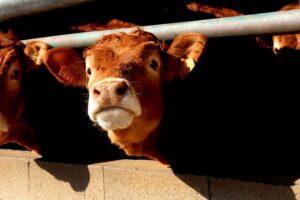The measures due to the foot-and-mouth disease epidemic have been amended and supplemented
The national chief veterinarian will introduce new measures and modify existing ones from March 30 in order to curb the foot-and-mouth disease (FMD) epidemic. Among other things, the organization of fairs and exhibitions presenting species susceptible to the disease will be prohibited throughout the country, and several restrictions will come into effect in the so-called additional restricted areas outside the observation and protection zones in the counties of Győr-Moson-Sopron and Komárom-Esztergom.

(Photo: Pixabay)
In the case of all restricted areas, it is prohibited to transport susceptible animals into them, and to export animals from them – regardless of their purpose – outside Hungary. In the protection and surveillance zones around the outbreaks in Slovakia and Hungary, animals susceptible to RSZKF must be kept closed until at least 7 April 2025 and may not be released to pasture, pens or runs. In these areas, except for domestic slaughter, susceptible animals may only be slaughtered in slaughterhouses designated by the authority, and several rules also apply to the transport of the resulting fresh meat, for example, these products may not be transported to other Member States or third countries. The areas outside the protection and surveillance zones, so-called further restricted areas, include the remaining part of Győr-Moson-Sopron County, and the Komárom, Tata and Esztergom districts of Komárom-Esztergom County. Within this area, the technological movement of animal species susceptible to RSZKF is permitted, but they may only be transported for immediate slaughter and only to a designated Hungarian slaughterhouse. A grazing ban will also be in effect in these areas until 9 April 2025, and the reintroduction of susceptible game species is prohibited.
The aim of all these measures is to prevent the further spread of the infection from the affected areas, one of the important tools for which is to reduce the number of susceptible animals present there
The virus is also spread by wind, and this is currently the most likely way of further infection in the given area. Although there is a vaccine against RSZKF, it only plays a role in reducing virus shedding, vaccinated animals must be killed later, so their widespread use is not possible. Regaining our immunity and thus the abolition of trade restrictions is only possible if all vaccinated animals are eliminated.
Nébih
Related news
State compensation for the victims of Bászna Gabona Zrt. has been completed
🎧 Hallgasd a cikket: Lejátszás Szünet Folytatás Leállítás Nyelv: Auto…
Read more >József Viski: Adaptation and competitiveness are key for the horticultural sector
🎧 Hallgasd a cikket: Lejátszás Szünet Folytatás Leállítás Nyelv: Auto…
Read more >Related news
Innovations, success stories and awards on the same stage
🎧 Hallgasd a cikket: Lejátszás Szünet Folytatás Leállítás Nyelv: Auto…
Read more >Farewell day at the 60th anniversary EuroShop trade fair
🎧 Hallgasd a cikket: Lejátszás Szünet Folytatás Leállítás Nyelv: Auto…
Read more >NAV: Women’s Day inspections begin
🎧 Hallgasd a cikket: Lejátszás Szünet Folytatás Leállítás Nyelv: Auto…
Read more >








